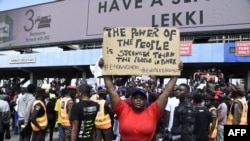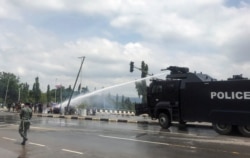Thousands of Nigerians marched in Lagos and other cities Monday to demand an end to the Special Anti-Robbery Squad, or SARS, a police unit accused of extrajudicial killings and abuses. The government announced Sunday the unit will be disbanded, but many Nigerians are skeptical, as officials have promised an end to the unit and its alleged abuses before.
In an address on Monday, Nigeria’s President Muhammadu Buhari said SARS officers responsible for wrongful acts would be brought to justice. He said disbanding the unit was the first step to extensive police reforms to ensure the primary duty of police would be to protect lives and the livelihoods of people.
However, singer-songwriter Davvyd Moore, who joined the protests against SARS in Lagos Monday, said any promises by the government need to come with real actions, as Nigeria has seen pledges of SARS reform before, to no avail.
Moore believes the government is merely trying to placate the protesters.
He and fellow activists are calling for rogue police to be investigated and punished by an independent body, and for those arrested during the ongoing protests to be released.
He said there also needs to be justice for people killed or abused by police.
Moore said reports of arrests, abuses and deaths during the protests were not a deterrent.
“It’s not going to stop us. That should be a motivation. Imagine a cause worth dying for. You see people dying, and you know people have died. And what we have started, if we don’t finish it, that’s very cowardly. We won’t step back — not for a second. We will keep pushing further until the government gives to us what we demand,” he said.
Osai Ojigho, director of Amnesty International’s office in Nigeria, said the human rights organization found a trend of young people being profiled and targeted by SARS officers.
Amnesty has recorded cases of extortion and torture, and failure by the Nigerian authorities to bring perpetrators to justice.
“To end the impunity of SARS, you need to overhaul the entire unit. And that’s why the dissolution or disbandment of SARS is a welcome development. But it needs to go deeper, as this is not the first time the government has actually banned SARS and banned them from doing the same practices which they continue, over and over again,” said Ojigho.
Amnesty is calling for independent and thorough investigations into these crimes and a timeline for actions with concrete steps.
Ojigho said there were links between the anti-SARS protests and the larger Black Lives Matter movement, with young people becoming more sensitized about state violence and the need for the state to protect, not oppress, people.
Ghanaian security expert David Agbee has followed the protests and the concerns about policing in Nigeria. He said the SARS unit has been problematic for years and policing across Nigeria needs reform, including training and better resources.
“Policemen in uniform are supposed to respect the fundamental rights of people. They are supposed to ensure that they give protection. They need to ensure they don’t kidnap people. When a group of people — citizens — are criticizing and questioning their professional conduct, then it tells you there is something you need to do,” said Agbee.
As demonstrations continue in Nigeria, there are growing reports of police force against protesters. At least one person has been killed since the demonstrations began, and police have been accused of opening fire and using water cannon and tear gas.
In his address, Buhari said there would be an investigation into the death, but blamed a "few bad eggs" for Nigeria's police misconduct.
He acknowledged "genuine concerns” by Nigerians “about the excessive use of force and in some cases, extra-judicial killings by men of the Nigerian Police Force."





